Feature
Why does The Guardian hate Tintin?
Movie Feature
Ali
1st November 2011
You may have already seen Steven Spielberg's new movie, The Adventures Of Tintin: The Secret Of The Unicorn. It's good, huh? Well, The Guardian couldn't disagree more: in fact, they've dedicated FOUR SIX separate op-ed pieces on why they disliked it so much. Protest much?
However, The Guardian disliked it. Really, really hated it. Hated it to the extent they commissioned four articles by four writers to vent on how horrible they thought it was. How is it possible that an otherwise brilliant paper like The Guardian can completely fail to see how a film like Tintin could be enjoyed by, say, the audience it was aimed towards? It's baffling.
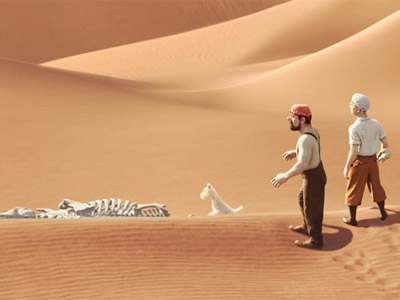
The first anti-Tintin article on The Guardian was the two-star review by writer Xan Brooks. I have absolutely no problem with him disliking it, but his negative review seemed pre-determined to hate on it - almost like it was written in advance. Check out his pretentious closing paragraph.
But hey, it's just one guy's opinion. Not everyone will feel this way, right?
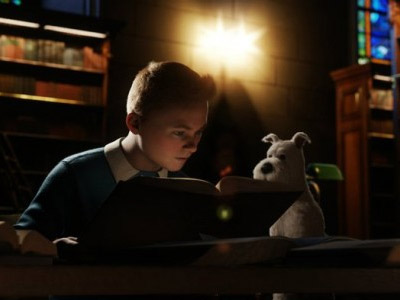
The next anti-Tintin rant, by Nicholas Lezard, is easily the most preposturous. Lezard starts his op-ed, titled 'How could they do this to Tintin?', by comparing watching Tintin to murder and sexual assault ("The sense of violation was so strong that it felt as though I had witnessed a rape"), yet it somehow defies the laws of logic to get worse.
It's an insanely over-analytical account of a movie that, in all honesty, is probably aimed at audiences a quarter of Lezard's age. Tintin is a classic literary creation, that's a given, and as a fan, Lezard has every right to feel aggrieved at Spielberg's take on the character, but there's something oddly over-dramatic about his piece. It's hard to take him too seriously when he calls the books "one of the consistently great works of art of the 20th century" and suggests that Tintin's feet always being on the bottom of Hergé's panels was a "subliminal stratum of plausibility" that Spielberg's work lacked. You can't win with some nerds.
Perhaps the most bizarre section of his article is the paragraph in which he lists the various instances of beds in the Tintin comics, and the lack of beds in the film. On and on he goes about the different occasions in which you see a bed across the different books (Actual quote: "Make your own list of the beds in Tintin. It's fun.")
Not only is Lezard's piece way out of touch, it misses the point by several thousand miles - that Tintin was written to be enjoyed by generation after generation, not just stuffy literature critics who feel it was written specifically for them and have the need to apply GCSE-level philosophy on books about a crime-solving boy and his dog. It's little surprise that Tintin doesn't rate well when assessed as an important work of art, as Lezard claims it is, but it's quite fun when viewed as, you know, a film. God knows what he made of The Smurfs. "The sense of violation was so strong, I felt like I had seen a nonce touching up a kid in a park."
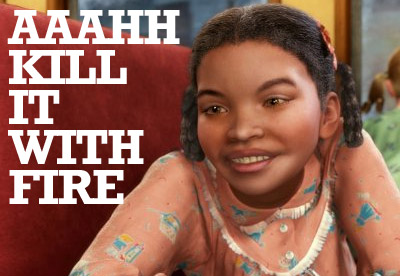
I do take umbrage with the fact Rose uses Freud to try and prove his point, however. I think if Freud saw Steven Spielberg's The Adventures Of Tintin, he'd have done his fucking nut and gone out and bought all the Happy Meals. Prove me wrong, Steve! Still, that's three features on the same film, and still not one person willing to entertain the notion that the film might actually be considered fun by some people.
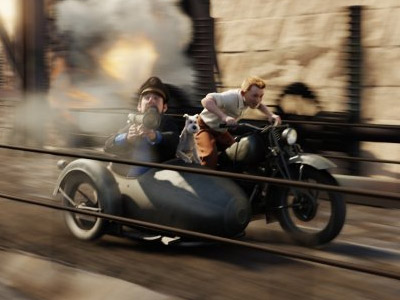
Finally, there's lovely old Peter Bradshaw, who joins the dissenting ranks with a paltry two-star review. Boo, Peter. Boo you. Unlike the other three anti-Tintin editorials, there's not the slightest hint of pretention here (Bradshaw even claims the only literary character he has any emotional attachment to is Biffa Bacon from Viz), but again, he bangs the drum marked 'performance-capture' for an entire paragraph – the fourth Guardian writer to do so in two weeks.
Not sure I understand this point, though:
Bradshaw's review is a moderately fair assessment, if a little too happy to back-slap his fellow haters, but at least he outlines what he dislikes and doesn't attempt to place Spielberg's work alongside Rembrant, Shakespeare and Mozart, or worse, compare it to rape. His closing sentence ("A disappointment") is just about the most succinct thing all four of the Guardian's writers have said about Spielberg's Tintin – two words that say more than four entire articles. That's the sort of over-egging of the pudding everyone is accusing Spielberg of, isn't it?
The only logical conclusion is that Tintin is the linchpin in the phone hacking scandal and The Guardian will do anything they can to silence the Belgian boy reporter, lest he leaks the names of a few certain private investigators who have been paying off Thompson and Thomson. Great snakes! What secrets do you hold, Mr Rusbridger?

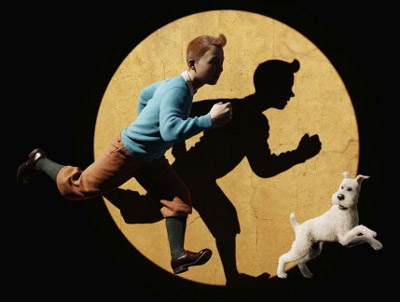
Support Us
Follow Us
Recent Highlights
-
Review: Jackass Forever is a healing balm for our bee-stung ballsack world
Movie Review
-
Review: Black Widow adds shades of grey to the most interesting Avenger
Movie Review
-
Review: Fast & Furious 9 is a bloodless blockbuster Scalextric
Movie Review
-
Review: Wonder Woman 1984 is here to remind you about idiot nonsense cinema
Movie Review
-
Review: Borat Subsequent Moviefilm arrives on time, but is it too little, or too much?
Movie Review
Advertisement
And The Rest
-
Review: The Creator is high-end, low-tech sci-fi with middling ambitions
Movie Review
-
Review: The Devil All The Time explores the root of good ol' American evil
Movie Review
-
Review: I'm Thinking Of Ending Things is Kaufman at his most alienating
Movie Review
-
Review: The Babysitter: Killer Queen is a sequel that's stuck in the past
Movie Review
-
Review: The Peanut Butter Falcon is more than a silly nammm peanut butter
Movie Review
-
Face The Music: The Bill & Ted's Bogus Journey soundtrack is most outstanding
Movie Feature
-
Review: Tenet once again shows that Christopher Nolan is ahead of his time
Movie Review
-
Review: Project Power hits the right beats but offers nothing new
Movie Review
-
Marvel's Cine-CHAT-ic Universe: Captain America: Civil War (2016)
Movie Feature
-
Review: Host is a techno-horror that dials up the scares
Movie Review
